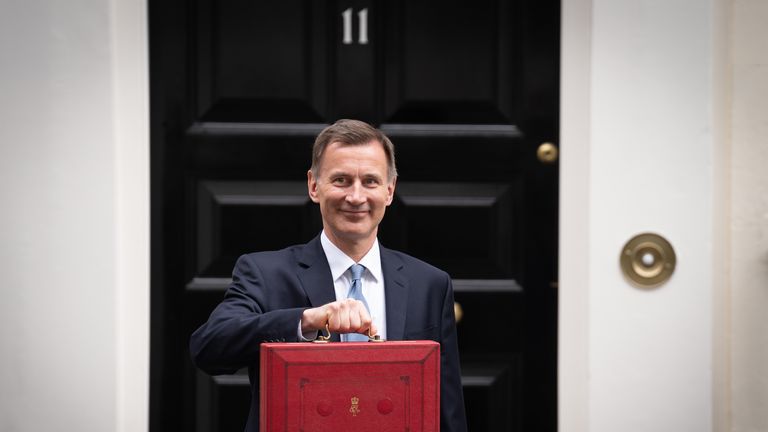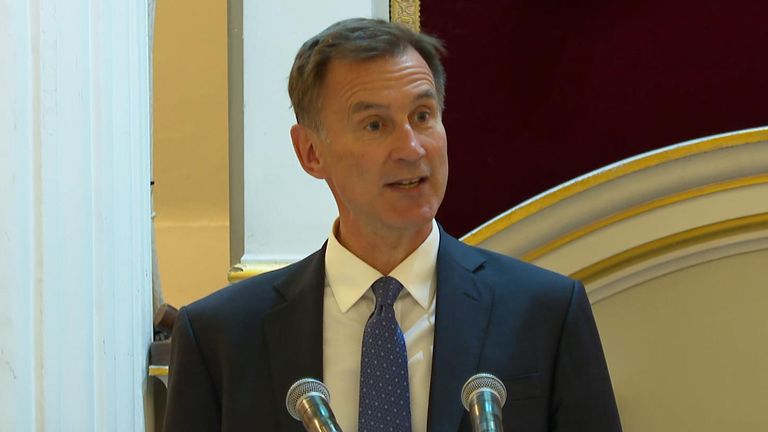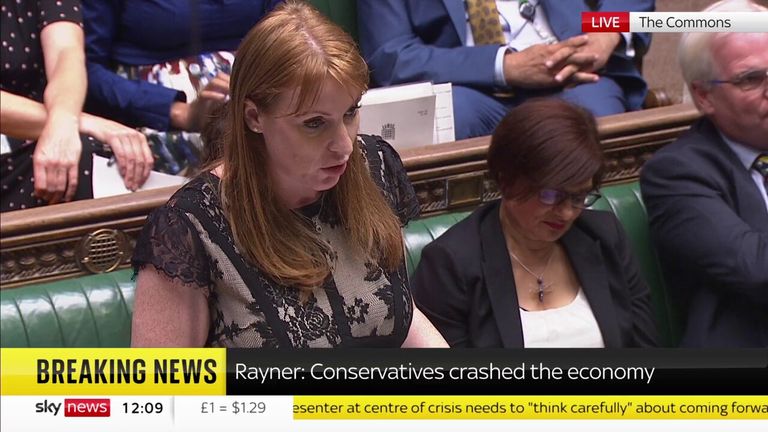National debt could hit 300% of GDP by 2070s, independent watchdog the OBR warns
The Office for Budget Responsibility sets out "significant" risks to the public finances, from climate change to defence, on top of the Treasury's current inflation-led headaches.
Thursday 13 July 2023 12:23, UK
The UK's national debt could hit 300% of GDP by the 2070s because of the string of major challenges still facing national governments after a "rapid succession of shocks", according to a report for the Treasury.
The independent Office for Budget Responsibility (OBR) laid out how climate change, defence and the fact people are living longer all posed significant, and current, risks at a time when the public finances are already reeling from COVID, cost of living support and higher interest rates.
The national debt hit a 60-year high of £2.56trn in May - equivalent to 100% of national GDP for a year.
The OBR's fiscal risks and sustainability report stated that the government's plans for stabilising and then reducing debt as a share of national output were relatively modest by historical and international standards.
That was despite a previous warning from the watchdog, in March, that the UK's tax burden was on course to hit the highest level since the Second World War by 2027/8.
Its conclusions also stated that as the baby boomer cohort retires and pushes up the cost of the so-called triple lock, state pension spending was expected to be £23bn higher in 2027/8 than at the start of the decade.
It also warned that rising take-up of electric vehicles was expected to cost £13bn a year in lost fuel duty by 2030.
The report, which looks at the long term risks, highlighted a number of immediate financial burdens including a projection that the hit from record long-term sickness in the workforce will cost the state a further £6.8bn this year in benefit payments.
It all makes for grim reading in Number 11 Downing St as the chancellor seeks an opportunity to deliver some goodies to the public ahead of the next election.
That prospect is looking more elusive by the day.
The OBR's findings were delivered just hours after the latest grim set of statistics covering the economy, with official figures for May showing a contraction for gross domestic product (GDP) of 0.1%.
Perversely, a flatlining economy is actually and temporarily good news for the government and Bank of England as both seek to bring down stubbornly high inflation.
Weaker demand in reaction to rising interest rates is what Bank policymakers are looking for before they can halt the tightening cycle that has resulted in 13 consecutive increases in Bank rate to date.
Rising interest rates, and market expectations for rates, are bad news for the taxpayer as well as wider borrowers, such as mortgage holders, because they have forced up borrowing costs.
Yields, the implied interest rate, on core 10-year UK government bonds hit 2008 financial crisis levels earlier this month.
Many UK IOUs are linked to inflation, making the cost of servicing the existing debt pile worse.
The OBR's report said: "The 2020s are turning out to be a very risky era for the public finances.
"In just three years, they have been hit by the COVID pandemic in early 2020, the energy and cost-of-living crisis from mid-2021, and the sudden interest rate rises in 2022, whose consequences continue to unfold.
"This rapid succession of shocks has delivered the deepest recession in three centuries, the sharpest rise in energy prices since the 1970s, and the steepest sustained rise in borrowing costs since the 1990s.
"And they have pushed government borrowing to its highest level since the mid-1940s, the stock of government debt to its highest level since the early 1960s, and the cost of servicing that debt to its highest since the late 1980s."
Chancellor Jeremy Hunt responded: "In common with many advanced economies, the UK's level of debt remains elevated following recent global shocks, including the pandemic and energy prices.
"This highlights why it is important to deliver on the Prime Minister's priority to get debt falling and to control borrowing to avoid adding inflationary pressures and risk prolonging higher inflation.
"That means taking difficult but responsible decisions on the public finances, including public sector pay, because more borrowing is itself inflationary."
Shadow chancellor Rachel Reeves said: "This report shows just how far we are falling behind our peers, how exposed our economy is, and again highlights that the government is failing to take action in areas like energy security to help get bills down."
She added: "It's time for them to step aside and let Labour restore our national economic and financial security, driven by our mission to secure the highest sustained growth in the G7."



